#predictive policing
Text
Hypothetical AI election disinformation risks vs real AI harms
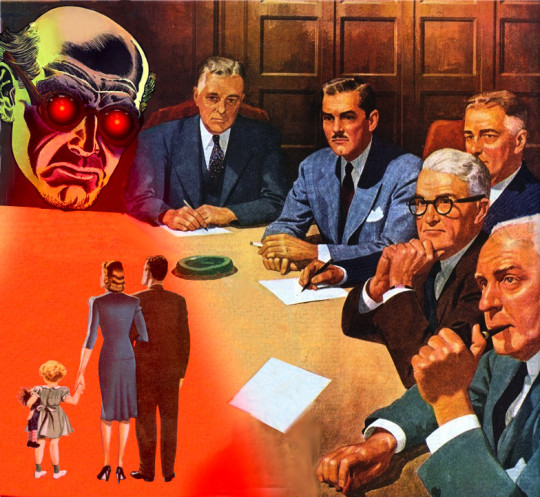
I'm on tour with my new novel The Bezzle! Catch me TONIGHT (Feb 27) in Portland at Powell's. Then, onto Phoenix (Changing Hands, Feb 29), Tucson (Mar 9-12), and more!

You can barely turn around these days without encountering a think-piece warning of the impending risk of AI disinformation in the coming elections. But a recent episode of This Machine Kills podcast reminds us that these are hypothetical risks, and there is no shortage of real AI harms:
https://soundcloud.com/thismachinekillspod/311-selling-pickaxes-for-the-ai-gold-rush
The algorithmic decision-making systems that increasingly run the back-ends to our lives are really, truly very bad at doing their jobs, and worse, these systems constitute a form of "empiricism-washing": if the computer says it's true, it must be true. There's no such thing as racist math, you SJW snowflake!
https://slate.com/news-and-politics/2019/02/aoc-algorithms-racist-bias.html
Nearly 1,000 British postmasters were wrongly convicted of fraud by Horizon, the faulty AI fraud-hunting system that Fujitsu provided to the Royal Mail. They had their lives ruined by this faulty AI, many went to prison, and at least four of the AI's victims killed themselves:
https://en.wikipedia.org/wiki/British_Post_Office_scandal
Tenants across America have seen their rents skyrocket thanks to Realpage's landlord price-fixing algorithm, which deployed the time-honored defense: "It's not a crime if we commit it with an app":
https://www.propublica.org/article/doj-backs-tenants-price-fixing-case-big-landlords-real-estate-tech
Housing, you'll recall, is pretty foundational in the human hierarchy of needs. Losing your home – or being forced to choose between paying rent or buying groceries or gas for your car or clothes for your kid – is a non-hypothetical, widespread, urgent problem that can be traced straight to AI.
Then there's predictive policing: cities across America and the world have bought systems that purport to tell the cops where to look for crime. Of course, these systems are trained on policing data from forces that are seeking to correct racial bias in their practices by using an algorithm to create "fairness." You feed this algorithm a data-set of where the police had detected crime in previous years, and it predicts where you'll find crime in the years to come.
But you only find crime where you look for it. If the cops only ever stop-and-frisk Black and brown kids, or pull over Black and brown drivers, then every knife, baggie or gun they find in someone's trunk or pockets will be found in a Black or brown person's trunk or pocket. A predictive policing algorithm will naively ingest this data and confidently assert that future crimes can be foiled by looking for more Black and brown people and searching them and pulling them over.
Obviously, this is bad for Black and brown people in low-income neighborhoods, whose baseline risk of an encounter with a cop turning violent or even lethal. But it's also bad for affluent people in affluent neighborhoods – because they are underpoliced as a result of these algorithmic biases. For example, domestic abuse that occurs in full detached single-family homes is systematically underrepresented in crime data, because the majority of domestic abuse calls originate with neighbors who can hear the abuse take place through a shared wall.
But the majority of algorithmic harms are inflicted on poor, racialized and/or working class people. Even if you escape a predictive policing algorithm, a facial recognition algorithm may wrongly accuse you of a crime, and even if you were far away from the site of the crime, the cops will still arrest you, because computers don't lie:
https://www.cbsnews.com/sacramento/news/texas-macys-sunglass-hut-facial-recognition-software-wrongful-arrest-sacramento-alibi/
Trying to get a low-waged service job? Be prepared for endless, nonsensical AI "personality tests" that make Scientology look like NASA:
https://futurism.com/mandatory-ai-hiring-tests
Service workers' schedules are at the mercy of shift-allocation algorithms that assign them hours that ensure that they fall just short of qualifying for health and other benefits. These algorithms push workers into "clopening" – where you close the store after midnight and then open it again the next morning before 5AM. And if you try to unionize, another algorithm – that spies on you and your fellow workers' social media activity – targets you for reprisals and your store for closure.
If you're driving an Amazon delivery van, algorithm watches your eyeballs and tells your boss that you're a bad driver if it doesn't like what it sees. If you're working in an Amazon warehouse, an algorithm decides if you've taken too many pee-breaks and automatically dings you:
https://pluralistic.net/2022/04/17/revenge-of-the-chickenized-reverse-centaurs/
If this disgusts you and you're hoping to use your ballot to elect lawmakers who will take up your cause, an algorithm stands in your way again. "AI" tools for purging voter rolls are especially harmful to racialized people – for example, they assume that two "Juan Gomez"es with a shared birthday in two different states must be the same person and remove one or both from the voter rolls:
https://www.cbsnews.com/news/eligible-voters-swept-up-conservative-activists-purge-voter-rolls/
Hoping to get a solid education, the sort that will keep you out of AI-supervised, precarious, low-waged work? Sorry, kiddo: the ed-tech system is riddled with algorithms. There's the grifty "remote invigilation" industry that watches you take tests via webcam and accuses you of cheating if your facial expressions fail its high-tech phrenology standards:
https://pluralistic.net/2022/02/16/unauthorized-paper/#cheating-anticheat
All of these are non-hypothetical, real risks from AI. The AI industry has proven itself incredibly adept at deflecting interest from real harms to hypothetical ones, like the "risk" that the spicy autocomplete will become conscious and take over the world in order to convert us all to paperclips:
https://pluralistic.net/2023/11/27/10-types-of-people/#taking-up-a-lot-of-space
Whenever you hear AI bosses talking about how seriously they're taking a hypothetical risk, that's the moment when you should check in on whether they're doing anything about all these longstanding, real risks. And even as AI bosses promise to fight hypothetical election disinformation, they continue to downplay or ignore the non-hypothetical, here-and-now harms of AI.
There's something unseemly – and even perverse – about worrying so much about AI and election disinformation. It plays into the narrative that kicked off in earnest in 2016, that the reason the electorate votes for manifestly unqualified candidates who run on a platform of bald-faced lies is that they are gullible and easily led astray.
But there's another explanation: the reason people accept conspiratorial accounts of how our institutions are run is because the institutions that are supposed to be defending us are corrupt and captured by actual conspiracies:
https://memex.craphound.com/2019/09/21/republic-of-lies-the-rise-of-conspiratorial-thinking-and-the-actual-conspiracies-that-fuel-it/
The party line on conspiratorial accounts is that these institutions are good, actually. Think of the rebuttal offered to anti-vaxxers who claimed that pharma giants were run by murderous sociopath billionaires who were in league with their regulators to kill us for a buck: "no, I think you'll find pharma companies are great and superbly regulated":
https://pluralistic.net/2023/09/05/not-that-naomi/#if-the-naomi-be-klein-youre-doing-just-fine
Institutions are profoundly important to a high-tech society. No one is capable of assessing all the life-or-death choices we make every day, from whether to trust the firmware in your car's anti-lock brakes, the alloys used in the structural members of your home, or the food-safety standards for the meal you're about to eat. We must rely on well-regulated experts to make these calls for us, and when the institutions fail us, we are thrown into a state of epistemological chaos. We must make decisions about whether to trust these technological systems, but we can't make informed choices because the one thing we're sure of is that our institutions aren't trustworthy.
Ironically, the long list of AI harms that we live with every day are the most important contributor to disinformation campaigns. It's these harms that provide the evidence for belief in conspiratorial accounts of the world, because each one is proof that the system can't be trusted. The election disinformation discourse focuses on the lies told – and not why those lies are credible.
That's because the subtext of election disinformation concerns is usually that the electorate is credulous, fools waiting to be suckered in. By refusing to contemplate the institutional failures that sit upstream of conspiracism, we can smugly locate the blame with the peddlers of lies and assume the mantle of paternalistic protectors of the easily gulled electorate.
But the group of people who are demonstrably being tricked by AI is the people who buy the horrifically flawed AI-based algorithmic systems and put them into use despite their manifest failures.
As I've written many times, "we're nowhere near a place where bots can steal your job, but we're certainly at the point where your boss can be suckered into firing you and replacing you with a bot that fails at doing your job"
https://pluralistic.net/2024/01/15/passive-income-brainworms/#four-hour-work-week
The most visible victims of AI disinformation are the people who are putting AI in charge of the life-chances of millions of the rest of us. Tackle that AI disinformation and its harms, and we'll make conspiratorial claims about our institutions being corrupt far less credible.

If you'd like an essay-formatted version of this post to read or share, here's a link to it on pluralistic.net, my surveillance-free, ad-free, tracker-free blog:
https://pluralistic.net/2024/02/27/ai-conspiracies/#epistemological-collapse

Image:
Cryteria (modified)
https://commons.wikimedia.org/wiki/File:HAL9000.svg
CC BY 3.0
https://creativecommons.org/licenses/by/3.0/deed.en
#pluralistic#ai#disinformation#algorithmic bias#elections#election disinformation#conspiratorialism#paternalism#this machine kills#Horizon#the rents too damned high#weaponized shelter#predictive policing#fr#facial recognition#labor#union busting#union avoidance#standardized testing#hiring#employment#remote invigilation
144 notes
·
View notes
Text
“European Watchdog Raises Bias Concerns Over Crime-Predicting AI”
🌐 Breaking News: The European Union’s rights watchdog has sounded the alarm! 🚨 Artificial Intelligence (AI) is under scrutiny, and the stakes are high. 🤖🔍
Headline: “EU Rights Watchdog Warns of Bias in AI-Based Crime Prediction”
Summary: The European Union Agency for Fundamental Rights (FRA) has issued a red alert regarding the use of AI in predictive policing, medical diagnoses, and targeted…
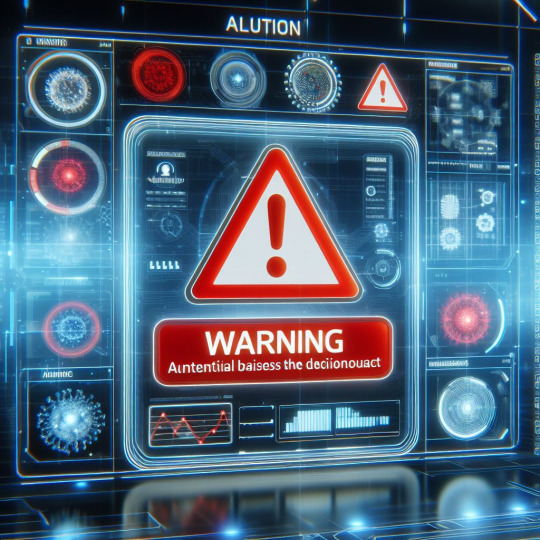
View On WordPress
#Algorithmic Bias#and Human-Centric AI.#Data Privacy#EU Rights Watchdog’s warning on AI bias: AI Ethics#Fundamental Rights#Predictive Policing#Transparency
0 notes
Text
The Future of Policing: Innovations in Public Safety Analytics

Policing has always been a dynamic field, adapting to societal changes and technological advancements. In recent years, one of the most significant shifts in law enforcement practices has been the adoption of public safety analytics. This cutting-edge approach to policing utilizes data analysis and technology to enhance crime prevention, response, and overall public safety outcomes.
Advancements in Data Analysis: Public Safety Analytics harnesses the power of advanced data analysis techniques to extract valuable insights from large and complex datasets. By analyzing crime patterns, trends, and risk factors, law enforcement agencies can better understand the dynamics of crime in their communities and tailor their strategies accordingly.
Predictive Policing Models: One of the most notable innovations in public safety analytics is the development of predictive policing models. These models use historical crime data, demographic information, and other relevant variables to forecast where and when crimes are likely to occur. By identifying high-risk areas and times proactively, law enforcement can allocate resources more effectively and prevent crimes before they happen.
Real-Time Crime Mapping: Real-time crime mapping is another groundbreaking application of public safety analytics. This technology allows law enforcement agencies to visualize crime data on interactive maps in real-time, providing officers with up-to-date information about crime hotspots, ongoing incidents, and emerging trends. By enabling quick and informed decision-making, real-time crime mapping enhances situational awareness and improves response times.
Get More Insights On This Topic: Public Safety Analytics
#Public Safety Analytics#Law Enforcement#Data Analysis#Predictive Policing#Crime Prevention#Technology#Community Policing#Ethics#Privacy#Collaboration
0 notes
Text
O.J. Simpson’s Twists of Fate: From Cancer Battles to Infamous Trials
In May 2023, O.J. Simpson shared a video on X (formerly known as Twitter), revealing that he had recently “caught cancer” and undergone chemotherapy. Although he didn’t specify the type of cancer, he expressed optimism about beating it. Fast forward to February 2024, when a Las Vegas television station reported that Simpson was once again receiving treatment for an unspecified cancer. In a…
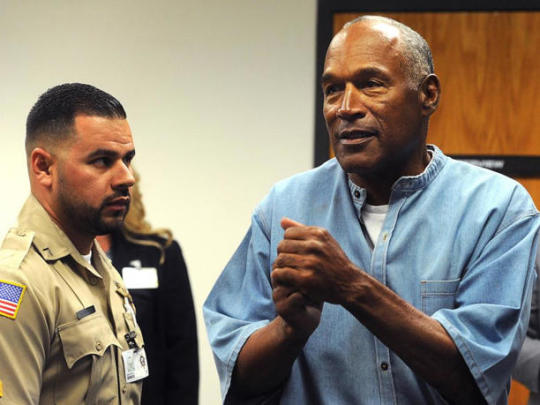
View On WordPress
#AI News#biometric identification#case prediction#crime prevention#document analysis#ethical AI#facial recognition#forensic analysis#kaelin#kato#legal research#machine learning#News#nicole simpson#O.J. Simpson#predictive policing#ron goldman#sentiment analysis
0 notes
Text
How AI Benefits Policing
Definitions AI (artificial intelligence): the field of computer science dedicated to solving cognitive problems commonly associated with human intelligence. An example of AI in policing is the algorithmic process that supports facial recognition technology. ADS (automated decision systems): computer systems that either inform or decide on a course of action to pursue about an individual or…
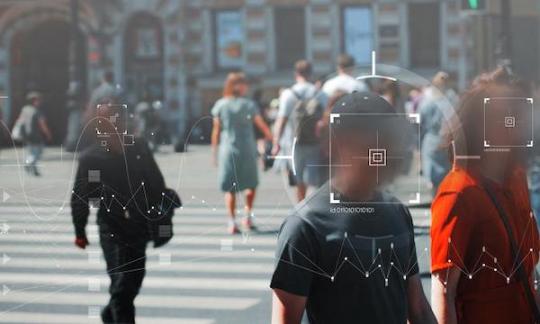
View On WordPress
#AI Policies#AI Policing#artificial intelligence#Crime Analyst#Crime Prevention#Police Technology#Predictive Policing
0 notes
Text
Sound Thinking, the company behind ShotSpotter—an acoustic gunshot detection technology that is rife with problems—is reportedly buying Geolitica, the company behind PredPol, a predictive policing technology known to exacerbate inequalities by directing police to already massively surveilled communities. Sound Thinking acquired the other major predictive policing technology—Hunchlab—in 2018. This consolidation of harmful and flawed technologies means it’s even more critical for cities to move swiftly to ban the harmful tactics of both of these technologies.
ShotSpotter is currently linked to over 100 law enforcement agencies in the U.S. PredPol, on the other hand, was used in around 38 cities in 2021 (this may be much higher now). Shotspotter’s acquisition of Hunchlab already lead the company to claim that the tools work “hand in hand;” a 2018 press release made clear that predictive policing would be offered as an add-on product, and claimed that the integration of the two would “enable it to update predictive models and patrol missions in real time.” When companies like Sound Thinking and Geolitica merge and bundle their products, it becomes much easier for cities who purchase one harmful technology to end up deploying a suite of them without meaningful oversight, transparency, or control by elected officials or the public. Axon, for instance, was criticized by academics, attorneys, activists, and its own ethics board for their intention to put tasers on indoor drones. Now the company has announced its acquisition of Sky-Hero, which makes small tactical UAVS–a sign that they may be willing to restart the drone taser program that led a good portion of their ethics board to resign. Mergers can be a sign of future ambitions.
In some ways, these tools do belong together. Both predictive policing and gunshot recognition are severely flawed and dangerous to marginalized groups. Hopefully, this bundling will make resisting them easier as well.
1 note
·
View note
Text

🚨💻👁️🗨️AI PREDICTING CRIME LIKE PRECOGS IN MINORITY REPORT: ARE WE HEADING TOWARDS A DYSTOPIAN FUTURE?🤖🔮
In the movie "Minority Report" 🎥🔮, the police used a unique form of crime prevention called "precrime" 👮♂️🚨, which involved three psychic individuals called precogs 🔮✨ who could see into the future and predict crimes before they occurred. The precogs were connected to a sophisticated computer system 💻🌐 that analyzed their visions and provided the police with the exact time and location of the predicted crime, allowing them to intervene and prevent it from happening 🚔⏱️.
The idea of using technology to predict and prevent crime is not new 🌟, and AI is increasingly being employed for this purpose 🤖🚨. However, the use of AI for predictive policing has raised concerns about the potential for bias and discrimination against certain communities 🚫⚖️, as well as the possibility of infringing on individuals' privacy and civil liberties 🕵️♂️🛑.
Some experts argue that relying solely on predictive policing algorithms can lead to a "slippery slope" ⛰️🔜 towards a future where people are judged and punished based on their predicted behavior rather than their actual actions 🤔. Moreover, the accuracy of these algorithms has been called into question 🧐📉, with studies showing that they may disproportionately target certain groups, such as people of color and those living in low-income areas 🎯🏚️.
Despite these concerns, some police departments around the world have already implemented AI-powered crime prediction systems 🌍🔍. For example, police in the UK 🇬🇧👮♀️ have used AI to catch drivers committing violations such as using their phones while driving 📱🚘 or driving without a seatbelt 🚗🚫, with pilot programs catching hundreds of violators in just a matter of days ⏳🚓.
While the use of AI in predictive policing may have some benefits 🌟, it's important to consider the potential consequences and ensure that these technologies are used in a fair and ethical manner that respects individuals' rights and freedoms ⚖️💡. Just like in "Minority Report," relying too heavily on AI for crime prevention could lead us down a dangerous path towards a dystopian future 🌃🌌.
#AI#predictive policing#Minority Report#RoboCop#artificial intelligence#crime prevention#technology#surveillance#privacy concerns#law enforcement#ethics#civil liberties#future#dystopian.
0 notes
Link
Cop casino
#predictive policing#spyware#facial recognition#surveillance#RCMP#unaccountability#technofascism#Orwell
0 notes
Photo
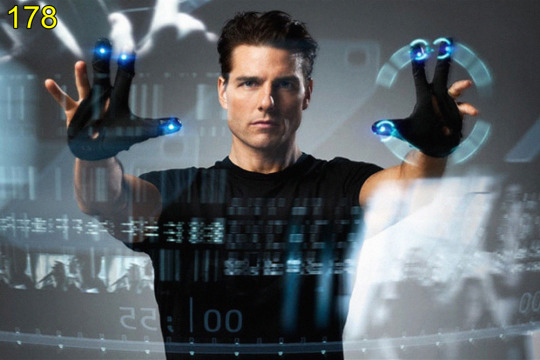
178. Minority Report: A Nova Lei (Minority Report, 2002), dir. Steven Spielberg
#cinema#steven spielberg#tom cruise#american movies#2000s movies#cult classic#sci-fi#crime#mystery#based on short story by philip k. dick#year 2054#washington d.c.#predictive policing#conspiracy#drug abuse#mass surveillance#eye scanning#murder#neo noir#on the run#premonition#cyberpunk#false accusation#kidnapping#produced by jan de bont#music by john williams#cinematography by janusz kaminski#academy awards nominee#20th anniversary#cult director
0 notes
Text
Okay, I was just thinking about a legal justice plotline in S3(meaning Wilhelm and Simon essentially having legal proceedings against August) and I don't think that we will get this in S3 at all but it's really really interesting to think about nevertheless.
Because usually in queer stories, coming out solves all the problems like a magical, fix-it-all solution and the mains live happily ever after. But YR heavily leans on realism and even if the S2 ending is an ambiguous but fitting ending for a queer show (sort of a coming out montage), it does not work for this show.
It has been repeatedly said by the cast and crew that Wilhelm's problem is not being queer, it's being a prince. The systemic traditions weighing on a person who can't even grieve his own brother without being shoved into empty traditions and a PR machiavelli. A person who cannot even fall in love with another person without a thousand worries crossing his mind in every move. A person who tried to confide in his own cousin but his privacy got shattered in front of the whole world instead. It's not that Wilhelm being queer itself is a problem. Instead the domino effect it would bring to people around him is the problem. And that's why it was such a task for Wilhelm to get his mother on board for the idea of a relationship with Simon- because everyone (and it includes Kristina) will try to enforce the heteronormative narrative again and again on him, pretending like his feelings don't matter because in the end, it's easier for them. It's easier for them to live in their centuries-old metaphorical gilded cages and try to enforce the traditions on the royal family itself because the monarchists and the rich (old AND new) thrive under the "stability" the monarchy provides to their social stature and their bulging pockets. Even August's motivations towards the crown are two-fold: he's not only in a constant want of power, but he is also a firm believer in continuing traditions and he directly benefits from the monarchy running as it is. And having the power in his hands will let him ensure that his own estates and rich-people solidarity is never threatened again.
But Wilhelm emerges as an anomaly in the system- he will not tie himself down to hollow traditions. And it threatens everyone's stability, which leads to the denial- and the swirling wave of change calms down. But then Wilhelm starts refusing all the traditions and eventually retracts the denial- and the wave hits all of them like a storm.
And Wilhelm trying to seek justice through the legal machinery is not only very poetic (a prince trying to seek fairness in a democratic system because the monarchy inevitably fails him), but it will also rock the boats of so many people. They will finally get to understand that rich and powerful people also have consequences for their actions and their safety nets can blow away no matter how much money they throw away to keep themselves afloat.
I can understand one argument that August is also young and maybe legal consequences will be a bit extreme for him. But, like, any other common person will be blown apart by the system despite being innocent, why is he any exception? If human lives have equal value, why their actions should be treated differently? I would still like August to have a chance at a realization of the severity of his actions rather than facing legal consequences, but I also do want him to face the legal mechanism or atleast face the fear of having legal consequences for his actions. These two things can co-exist. Simon can easily be torn apart because of the whole dealing thing, and no one would come and save his ass for it. It's the biasness for me.
Overthrowing the monarchy or letting August have a redemption arc is just not possible in a single 6-episode season. It will simply be unnatural to the progression of the story. However, atleast in my head, Wilhelm and Simon seeking justice through a legal system can bring the consequences into action without the added labour of scrapping away a deeply rooted institution or changing the way a person's psyche works.
#young royals#prince wilhelm#simon eriksson#august of årnäs#i don't even know if it's logistically possible and i am not putting it out as a prediction or something at all#it was just swirling in my head and you should just let your mind wander sometimes methinks#they both are minors and Wilhelm being a prince is also a big problem with this#but August's stepdad being a lawyer#Sweden's one of the best lawyers apparently#and Sara filing a police report at the end of s2#the way Wilhelm raking back the denial will lead to a public reaction and can lead to people discussing about the perpetrator#i just can't stop thinking about a legal storyline ngl#but again this is also very difficult to fit in a 6-episode season tho so yeah
105 notes
·
View notes
Text
I played Sam and Max Hit the Road and binged through the cartoon. I'm waiting to see if the bundle for seasons 1 & 2 of the Telltale games go on sale when we get a release date for season 3.
I'm trying to avoid spoilers, but in the meantime I'm still following the Sam and Max tag. Needless to say all of y'all's angsty fanart is really giving me a skewed idea of what to expect going forward. I think at least one of them dies??? And I could not for the life of me tell you which one.
Don't tell me by the way, I want to be surprised.
#maybe once I buy all 3 seasons I should try to predict what they’re about based on the titles#sam and max#freelance police#sam and max spoilers#is this a spoiler?? I don't even know!!
22 notes
·
View notes
Text
S/o to my little sister because when the angry man i just rejected/cancelled my trip with called me wasted last night at 3:30am she stomped downstairs to angrily whisper-shout JUST HANG UP ON HIM ! You are the woman in Noah kahan’s Dial Drunk song do you realize that . He is going from CHARMING TO ALARMING IN SECONDS ! which was somehow the perfect most effective argument to hit me with
#Inb4 i literally only answered bc i was worried something was wrong & now i am OBVIOUSLY TRAUMATIZED when ppl call me at odd hours because#last week it was LITERALLY A SUICIDE !#Anyway then toronto police literally stopped him so she’s a prophet & it became a complete caricature of her prediction .
25 notes
·
View notes
Note
the no fly list is 100% an example of government surveillance and works through the amorphous threat of consequences you are exactly right and not overreacting. it's also not at all common knowledge in the US that for most people the no fly list ends up being a minor inconvenience. signed, political geographer researching privacy and surveillance
Oh thank you SO MUCH! I was quite worried. Although tbh I think it would have been better if I had been the one overselling it. :/
#i've been getting an unfortunate crash course in this stuff since sri lanka's mass protests last year#whenever a govt starts up about ''counter-terrorism'' it's a ploy to get rid of democratic freedoms#i think at this point they should just stop making science fiction dystopians#because the govts and big tech seem to be getting their ideas directly from them#Im never getting over 'pre-crime predictive algorithm'#they're making the no fly list from something that was literally in Minority Report 😭#state surveillance#human rights#social justice#no fly list#usamerican imperialism#war on terror#police state#anon#asks#knee of huss
68 notes
·
View notes
Text
reads more lore: Halo is so fucking stupid
#crab text#trawling my digital copies of books. getting to Halsey's journal and going oh they used an algorithm to predict unrest in the colonies....#a dark age you say? people rebelling against an imperial power could end humanity? jesus fucking christ#we need a state controlled policing force to maintain the status quo. but its okay bc master chief#god i hate halo
13 notes
·
View notes
Text
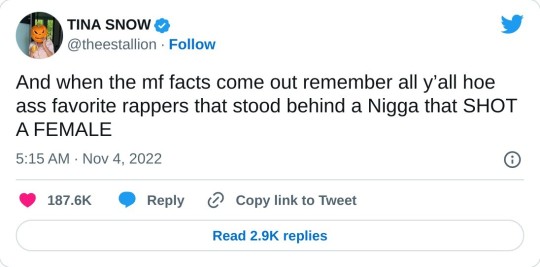
I will never forgive you niggas for the way you dogged Meg. She really did not deserve all that hate when she was telling the truth the whole time. That little midget lied and yall worship him, yall slutted yourselves out, but you have the audacity to wonder why people hate you bastards? Forever I fqucking hate the following(some more stronger than others)
DRAKE
DABABY
JUSTIN BIEBER
50 CENT
ZACH CAMPBELL
AKADEMIKS
MR JACK HARLOW
Among Others
This aged so well sis 💜
Literally Death to all who didn’t believe her the first fqucking time. Death to all them
When you make a tweet that ages perfectly

When that same tweet reminds you of those who done mother dirty

#remember yall hoe ass favorite rappers who stood behind a nig that shot a female#stay outraged#never forget#never forgive#mother predicted this#❤️❤️���️❤️❤️❤️❤️❤️❤️❤️❤️❤️❤️❤️❤️#This whole case had me changing my opinions and views(at least for the moment)#celebrating the police and the system#being xenophobic towards Canadian people#posting stories with reader plus white celebrities with fluffy or smutty material#nearly being racist towards black men#saying that some of them nigcels deserved to be another hashtag#and backing the death penalty.#megan thee stallion#i’m not sad for her#i’m outraged#i’m just glad she’s in a better place now#those people can speak for themselves they know who they are#and they can go straight to hell#they will pay for their crimes#for sucking that abusers meat#Instagram#As always a loud and sincere fuck you to everyone who has doubted her and supported that Canadian cuntery who must not be named#She went through unnecessary trauma for two years#That’s unforgivable#Next level fuckery#That that type of ish that would lead to an episode of snapped or deadly women#once again#🖕🏿daystar Peterson#annnnn boom
18 notes
·
View notes